- Home
- entertainment
- news
- How the cast of 'Painkiller' on Netflix compares to the real-life people they play
How the cast of 'Painkiller' on Netflix compares to the real-life people they play
Libby Torres

- "Painkiller" follows the Sackler family as their company, Purdue Pharma, develops and distributes OxyContin.
- The show is based on true events. Some of the characters are fictional, while others aren't.
Clark Gregg plays Arthur Sackler, the eldest of the three Sackler brothers.
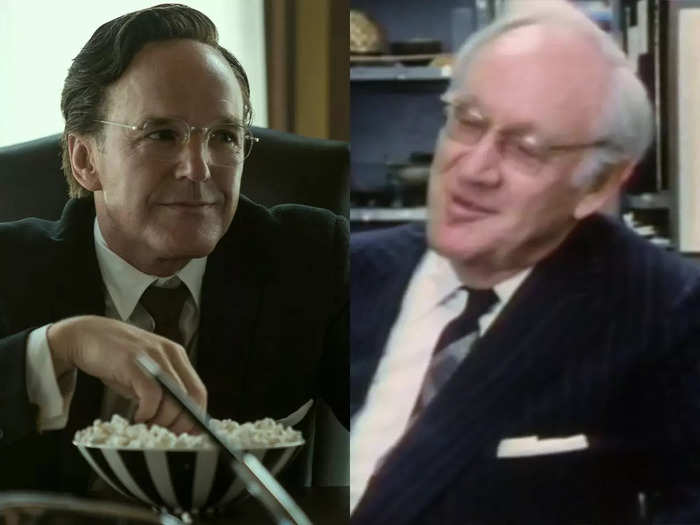
Arthur, along with his two brothers, bought Purdue Frederick, the parent company of Purdue Pharma, in 1952.
As a research psychiatrist, Arthur helped grow the family's fortune through pharmaceutical marketing. He was described by The New York Times as "one of this country's leading art collectors and patrons" in his obituary, and was also known for his donations to major museums like the Metropolitan Museum of Art in New York.
While he died of a heart attack at age 73 in 1987, years before OxyContin was invented, "Painkiller" argues that Arthur's marketing practices for drugs at other companies, like Pfizer, were a huge source of inspiration for the remaining Sacklers at Purdue Pharma as they developed the opioid and distributed it. In 1997, Arthur was posthumously inducted into the Medical Advertising Hall of Fame, which said he "helped shape pharmaceutical promotion as we know it today."
Speaking to the Washington Post in 2019, his widow, Jillian Sackler, described Arthur as a mentor to his brothers in their youth but said that he played only a passive role in Purdue Frederick after 1960 and was barely in contact with Mortimer and Raymond in the years before his death.
John Rothman portrays Mortimer Sackler, another of the brothers.
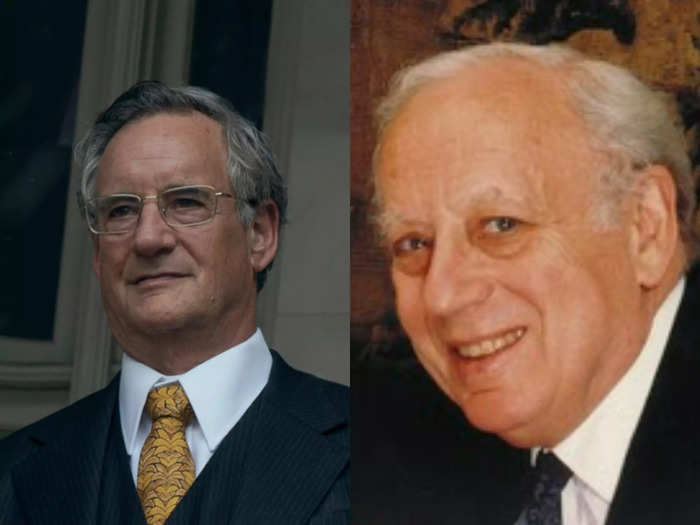
Like Arthur and Raymond, Mortimer was a psychiatrist. According to The Independent, Mortimer served as a co-chairman of Purdue from 1952 until 2007. He died in 2010 at age 93.
Mortimer had three wives and seven children — according to The Guardian, three of his kids served on the board of Purdue Pharma at various points. His third wife, Dame Theresa Sackler, is known in Europe for her philanthropy.
However, as the Financial Times reported, donations from Mortimer Sackler's relatives have come under scrutiny as Purdue Pharma continues to face legal action for its part in the opioid crisis, and the Sackler name has been removed from multiple institutions that received money from the family.
Raymond Sackler, the youngest brother, is played by Sam Anderson.
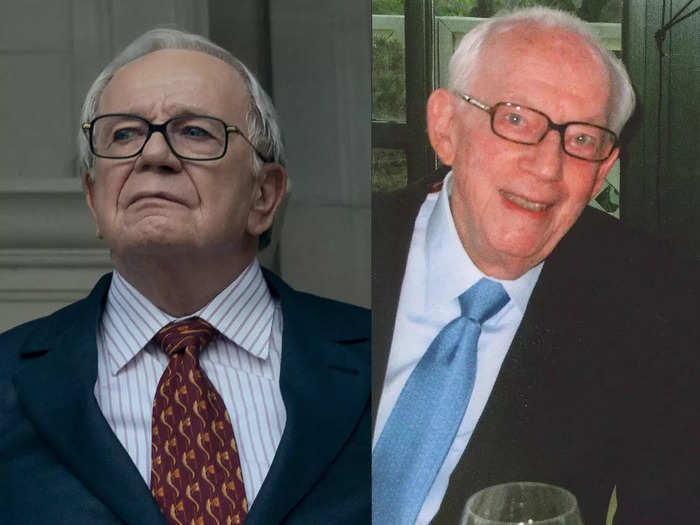
Raymond was another former chief executive at Purdue Pharma. According to Politico, Raymond and Mortimer served as co-chairmen for years, and Raymond was the company's president from 1991 to 1999.
He had two children, Jonathan and Richard, with his wife Beverly. He was described by The New York Times as a "pioneer in psychopharmacology," and along with his brothers, founded the Creedmoor Institute of Psychobiological Studies at the Creedmoor Psychiatric Center in Queens, New York.
Raymond and his wife were major philanthropists who supported a variety of museums and medical colleges. He died in 2017 at age 97.
Matthew Broderick stars as Richard Sackler.
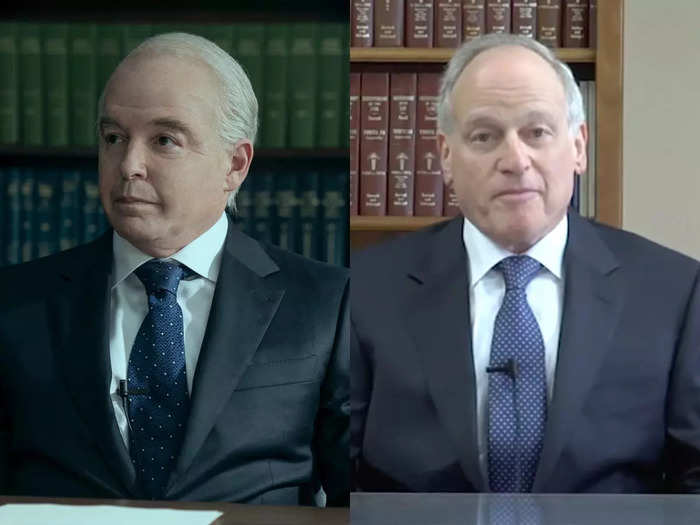
Richard was the president of Purdue Pharma from 1999 to 2003, Before that, he was involved in the marketing of OxyContin, which Purdue started selling in 1996.
He stepped down as president in 2003, but remained on the board until 2013.
Richard, along with other individual Sackler family members, has never faced criminal charges related to the marketing of OxyContin. While giving testimony in federal bankruptcy court during a 2021 hearing for Purdue's proposed restructuring and settlement for its role in the opioid crisis, Richard maintained that he, his family, and Purdue were not responsible for the opioid crisis in America.
Noah Harpster plays FDA official-turned-Purdue-employee Curtis Wright.

As the show depicts, Curtis Wright really did leave the FDA and later work at Purdue Pharma.
Per a 2006 Department of Justice memo (which proposed an indictment of several key Purdue Pharma executives), Wright advised Purdue Pharma on how to accelerate the approval of Oxycontin while under the employ of the FDA. A year after Wright left the FDA, he took a job at Purdue Pharma with a compensation package of "at least $379,000," according to the DOJ.
US attorney John Brownlee is played by Tyler Ritter.

On the show, Ritter's Brownlee is seen working closely with fellow attorney Edie Flowers (Uzo Aduba) to bring Purdue to justice.
In real life, Brownlee led an investigation into Purdue Pharma and their approach to marketing OxyContin in the early 2000s, after being appointed a US attorney in the Western District of Virginia. (A LinkedIn profile appearing to belong to Brownlee lists his appointment year as 2001.) He was ultimately able to secure a criminal conviction against the company and three key executives, but thanks in part to the efforts of Rudy Giuliani, whose law firm was hired by Purdue, the pharmaceutical company was able to continue producing OxyContin.
Aduba's character doesn't appear to be based on an actual person, but the real-life Brownlee continued his prolific career in law after leaving the US Attorney's office. He also defended the deal he made with Purdue, which allowed the company to continue selling OxyContin, years later in an interview with the Guardian.
However, Brownlee admitted in the same interview that he was taken aback by the fact that other prosecutors and government regulation agencies hadn't done more to address Purdue's handling of OxyContin after his case.
Brian Markinson played Purdue's lawyer Howard Udell.
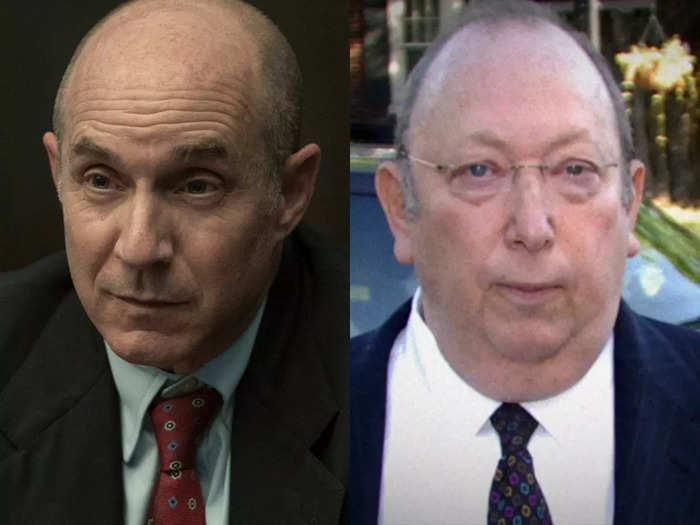
Udell, the longtime general counsel for Purdue Pharma, died in 2013 at age 72. He was one of the company's three senior executives — along with former medical director Dr. Paul D. Goldenheim and then-president Michael Friedman — to plead guilty in 2007 in a federal lawsuit against the company.
However, thanks in part to the efforts of Rudy Giuliani and his firm, Udell, Goldenheim, and Friedman didn't have to do prison time. Instead, they paid a collective $34.5 million in fines, while Purdue was fined $640 million.
In the years between his career at Purdue and his death, Udell co-founded the Connecticut Veterans Legal Center and helped veterans facing legal issues, according to the Hartford Courant.
Popular Right Now
Popular Keywords
Advertisement